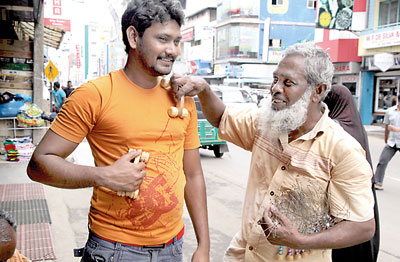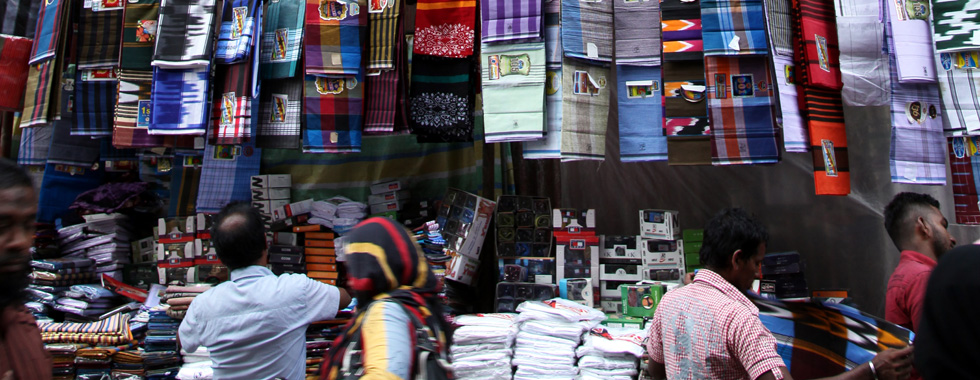Labai, labai, come to Pettah!
View(s):Kumudini Hettiarachchi takes a walk through Main Street to feel the Avurudu pulse
It’s that time of year again, when the call of the koha and the burst of blooms on the erabadu trees herald a new beginning for Sri Lankans.
The countdown for the Sinhala and Tamil New Year has begun and the traditional ‘place of gathering’ is buzzing once again. Streams of men and women, either carrying little children or holding tightly to reluctant slightly older ones dodge other families, hand-pushed carts, trishaws, motorcycles, cars and trucks, braving the dust, fumes and heat to pick up this or that, mostly clothes and toys, along Main Street.

Time for innovation: ‘Stop’ and buy a banian seems to be the call of this vendor. Pix by M.A. Pushpa Kumara
Pettah’s heartland is Main Street stretching in a line from Malwatte Road to Gas-Paha Handiya (junction), with 1st, 2nd, 3rd, 4th and 5th Cross Streets intersecting it. While the giant businesses with their posh buildings hug Main Street and the maze of Cross Streets, what fascinates the New Year shoppers are the numerous knick-knacks in addition to clothing spread out on boxes or crates as make-shift street stalls.
Innovation seems to be the name of the game with some pavement hawkers making use of a stop-sign by the wayside to display underwear, others using a rope-net covering a building under construction as a clothes display line and two or three having their own individual stands.
“Serama imported,” calls out one vendor, “haraseeyayi-haraseeyayi, thorala ganna,” shouts another. The raucous cries draw the people to different kinds of stuff on display and the haggling begins. The “goods” range from the mundane to the exotic…………pins to panties, bed-sheets to bras, towels to taps, wigs to wind chimes, shoes to scissors, socks to spectacles, bottles to bags and parasols to puzzles, knives to naphtha balls and purses to phone pouches. Anything and everything is available in the Pettah.
A knot of young men rummage through a heap of ‘long-shorts’ and the vendor is busy flicking off a measuring tape from around his neck to get their sizes right, opposite the more staid three-storey London Suiting Shop. A hanger-on is the shorts vendor’s helper, taking up the shouts of “a pair for panseeya” while also hurrying in search of change for a 1,000-rupee note.
Suddenly a duck is shoved in our faces, with the vendor pressing a button to make it shoot out its tongue, urging that the “muppet from cartoons on TV” be taken home for a few hundred rupees, as a little distance away a battery-operated train chugs round and round on its tracks and little ones are pulling at the hands of parents and dragging their feet when passing a cloud of gossamer bubbles blown from a tiny elephant.
Vendor Mohamed Fazli has moved on from selling water bottles and schoolbags to the business of puzzles. “This is the latest in the market,” he says, explaining that it is “good for the igenuma” (good for learning) and parents buy them as gifts for their children.
When asked how business is this Avurudu season, he is joined by other pavement hawkers who shake their heads in despair over “low sales”. For two-three hours, they say, they have had no sales, while one or two add that they have had a little business of about Rs. 700.
The people come, they look but they just don’t have the money to buy stuff, says a vendor who does not wish to give his name, echoing the hope of all that business would pick up after April 5 when the people would have their festival advances in their pockets.
They are strident in their views that Pettah, particularly Main Street, lost its vigour when the authorities moved the pavement hawkers out to Goonesinghepura.
With the pavement hawkers getting a temporary respite to sell their products at their old haunts last December and this Avurudu season, many believe the hustle and bustle is back to make Pettah vibrant again.
“When we were moved out, the crowds thronged towns like Nugegoda, Kiribathgoda and Maharagama because they didn’t have an option,” says N.H. Nihal, pointing out that none of these places can beat the range and the price offered by Main Street.
Minnissu athe salli ne, says N.A. Piyaratne who has been hawking stuff on Main Street for the past 24 years minus the three or four years when they were debarred from the area. This year he has on sale knife-sharpening stones, oil cans, filters to be fixed to taps and other knick-knacks.
“I have bought everything I need for my family,” says a mother, clutching sili-sili bags filled to bursting point, at the same time keeping a sharp eye on her toddler to make sure that he doesn’t step into the way of an oncoming vehicle, before they both jump into a trishaw to head for home.
Curious glances are cast by all and sundry, when one pavement hawker has an altercation with a truck driver for obstructing his business, as D.M. Gnanasena has a quick word with his two young daughters whether they want pink, black or white underskirts.
“We like to come to the Pettah to buy a few clothes and toys for Avurudu,” says Gnanasena from Talangama, explaining that most probably he would come back with the rest of the family, wife and three other children, over the weekend.

It’s massage time on Main Street
The taka-taka sound of a bere summons people to another area of Main Street as a man lays out some of his goods. No, he is not selling anything, only his prowess as a self-taught magician, making coins move from under one glass to another. He holds people’s fascination by exhibiting a plastic box, the size of a small tiffin-carrier, in which he says there is a snake. “I will give a prize to anyone who can identify this creature,” he challenges, going on with his magic show. After 45 minutes, we leave, without our curiosity fulfilled for the snake has still not been uncovered.
As the stream of shoppers becomes thicker, some weary ones drag themselves into the small food stalls displaying short-eats and cool drinks. Others munch hot and spicy vadai with a tempting prawn atop straight from the frying pan while sipping a kahata and the more adventurous ones stop by the achcharu-cart to get a small bagful of mouth-watering pineapple, nelli, lovi, veralu, mango, guava, amberella or divul portion.
As the evening shadows lengthen and the pavement hawkers begin to pack up their goods and we make ready to leave, we spot a crowd at the “massage” seller. Taking a willing passer-by he demonstrates his wares. Any aches or pains or just need relaxation, he has oluvata (for the head), angeta (for the body), pita kondata (for the backbone) and also a contraption like a hand to scratch one’s back.
After a long walk up and down Main Street and along all those Cross Streets buying what they want and sometimes even what they don’t want, most probably what the weary shopper needs is the one which massages the yati-pathula (soles of the feet).
The beginnings
Starting as a small shop at Kayman’s Dorakada (now known as gate) opposite the belfry, then moving to 154, 1st Cross Street and now occupying the premises right opposite, Titus Stores has long been a landmark of Pettah and the Main Street.
In the early days, there were trams, buses, bullock-carts and only rarely a lorry plying along Main Street, recalls the owner of Titus Stores, Joe De Livera, whose father had set up the business back in 1924.
Pettah is a pocket of land traditionally associated with business, points out 83+plus Mr. De Livera, going back in time to 1949 when he brought a load of goods from the port in a Ferguson tractor. It was the first time people had seen a tractor and all eyes were agog, he smiles.
The pavement hawkers came with J.R. Jayewardene’s government in 1977, when they were allowed to occupy the empty pavements, “changing the face of Pettah drastically,” he says, adding that now there are more than 280 such vendors.

Follow @timesonlinelk
comments powered by Disqus


















